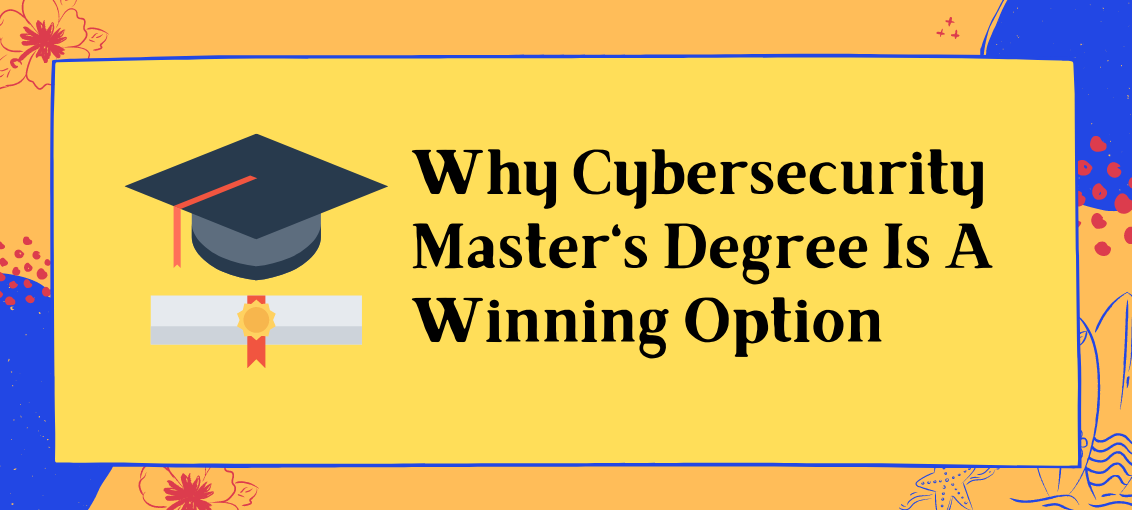Here, you will learn why a cybersecurity Master’s Degree is a winning option.
Getting an undergraduate degree used to be the required benchmark. As time passed, more organizations needed a master’s degree. This requirement helps to filter the best candidates for a job. Additionally, popular, in-demand, and well-paid fields today mostly revolve around IT. As such, a cybersecurity master’s degree has many advantages.
While cybersecurity can be learned in various ways, a lot of which exclude formal education, the increase in the activities of hackers necessitates the need for having specialists with a higher certificate. Therefore, in this article, you will learn why getting a cybersecurity master’s degree is a winning option for your future.
Table of Contents
How You Can Benefit From a Mater’s Degree in Cybersecurity
1. Higher Remuneration
In general, a cybersecurity expert makes a decent living. An average engineer makes about $90,000 annually.
This figure is mainly for those who have an undergraduate degree. This remuneration significantly increases once you get a master’s degree. You can easily make over $200k per year by working in the field with a master’s.
2. Job Security
There are several roles a cybersecurity expert can take on. Some positions include:
- IT auditor;
- Analyst;
- Cybercrime investigator;
- Security administrator;
- Pen-tester;
A well-trained cybersecurity expert with a master’s degree can confidently apply for any of these positions.
Therefore, security specialists who look to obtain higher qualifications significantly increase their job selection and security.
3. More Employment Opportunities
Obtaining a cybersecurity undergraduate certificate can quickly get you a job. However, getting a higher degree expands your horizons by giving you more employment opportunities.
In particular, having a background in computer science or a similar course can be beneficial. Programs that help with learning cyber security for students are abundant and varying, so you can definitely find something that speaks to you.
Likewise, getting a higher degree makes it easy to obtain other professional certificates. These qualifications are essential for managerial positions. You can quickly get work as an executive within the internet security industry.
4. Flexible Learning Options
Obtaining any degree used to be a one-way approach. You needed to enroll in a full-time program, which could be challenging, especially for working individuals. Now, you can quickly and effortlessly get any certificate online.
Such flexibility gives you the ability to work, study, and have a vibrant personal life without sacrificing your education.
In addition, you get to combine your experience and education to succeed in your profession. Similarly, you can use GrabMyEssay for your academic writing and not waste any extra time on tedious assignments.
Instead, you can focus on pursuing something you enjoy and will benefit from, like cybersecurity.
5. Improved Job Satisfaction
Having lower-level certificates may get you a job, but it may not grant you the job satisfaction you deserve. However, having a master’s in cybersecurity can put you in a better position against your competition.
The job satisfaction you may get can come from being promoted from one position to another in a workplace faster, as well as superior better job conditions or bonuses as a more experienced and valuable worker.
In addition, you can get a better job offer in another firm. Earning a master’s degree can also help you become self-employed if that is what you prefer.
6. Investment in your future
Getting a master’s certificate can be expensive. However, such an investment is mostly worth it. Most people who opt for a graduate program in cybersecurity eventually get the required remuneration to pay off any debt they incur.
Similarly, there are scholarship programs you can access to reduce the money you have to pay for the program. In any case, cybersecurity is certainly a field that will stay relevant for decades, so you do not have to worry much about future job options.
Level Up Your Cyber Defense: FAQs on Why a Master’s in Cybersecurity Wins
A Master’s in Cybersecurity can elevate your career prospects in this high-demand field. This FAQ explores the reasons why it might be a winning option for you.
Why Pursue a Master’s in Cybersecurity?
Here are some compelling reasons to consider a Master’s degree:
- Advanced Knowledge and Skills: A Master’s program equips you with in-depth knowledge of complex cybersecurity topics, ethical hacking techniques, and the latest security practices.
- Career Advancement: A Master’s degree can open doors to senior-level cybersecurity positions, leadership roles, and specialized areas like digital forensics or incident response.
- Increased Earning Potential: Master’s degree holders in cybersecurity often command higher salaries compared to those with bachelor’s degrees alone.
- Networking Opportunities: Master’s programs connect you with professors, industry professionals, and fellow students, building a valuable network for career advancement.
- Specialization: Many programs offer specializations in specific areas like cloud security, network security, or cyberwarfare, allowing you to tailor your expertise.
Master’s vs. Bootcamp?
While bootcamps offer faster entry into the field, a Master’s degree provides a deeper understanding of the subject matter. Here’s a breakdown to help you decide:
- Master’s: More in-depth knowledge, broader career options, the potential for higher salaries, take longer to complete (typically 1-2 years).
- Bootcamp: Faster completion time (weeks or months), specific skill-focused training, may not qualify you for all cybersecurity jobs.
Is a Master’s in Cybersecurity Worth It (UK)?
The answer depends on your career goals and current experience. In the UK, a Master’s can be valuable for:
- Career Changers: Individuals looking to transition into cybersecurity from a different field.
- Upskilling for Advancement: Professionals seeking to move into senior cybersecurity roles.
- Specialization: Those wanting to specialize in a particular cybersecurity domain.
The cybersecurity job market in the UK is growing, and a Master’s degree can make you a strong candidate for these positions.
Here are some additional factors to consider:
- Cost of Attendance: Research tuition fees, scholarship opportunities, and the potential return on investment.
- Program Reputation: Choose a program with a strong reputation and experienced faculty.
- Alignment with Your Goals: Ensure the program curriculum aligns with your specific career aspirations.
By carefully considering these factors, you can determine if a Master’s in Cybersecurity is the winning option for your future in this dynamic field.
Conclusion
Getting a master’s degree in cybersecurity is highly beneficial to any tech-savvy student. It allows you to get higher income within the industry, improves job security, and gives you access to more opportunities.
The learning process is flexible, which lets you work and study simultaneously. If it is a path for you, hesitate no more and start working towards getting your cybersecurity degree right away!
OTHER POSTS
- Is Online Cyber Security Training Worth It?
- 5 Reasons Why You Should Study For A Cybersecurity Degree
- How To Get A Cybersecurity Job With No Experience
- Investing 101: Should You Use Investment Apps?
- 7 Best Cyber Security Colleges
- Should Marketing Students Learn Cybersecurity?
- Cybersecurity Education: Choosing the Right Degree Program for You
- Making the Right Career Choice – Key Factors to Consider
About the Author:
Gina Lynch is a VPN expert and online privacy advocate who stands for the right to online freedom. She is highly knowledgeable in the field of cybersecurity, with years of experience in researching and writing about the topic. Gina is a strong advocate of digital privacy and strives to educate the public on the importance of keeping their data secure and private. She has become a trusted expert in the field and continues to share her knowledge and advice to help others protect their online identities.
Christian Schmitz is a professional journalist and editor at SecureBlitz.com. He has a keen eye for the ever-changing cybersecurity industry and is passionate about spreading awareness of the industry's latest trends. Before joining SecureBlitz, Christian worked as a journalist for a local community newspaper in Nuremberg. Through his years of experience, Christian has developed a sharp eye for detail, an acute understanding of the cybersecurity industry, and an unwavering commitment to delivering accurate and up-to-date information.








